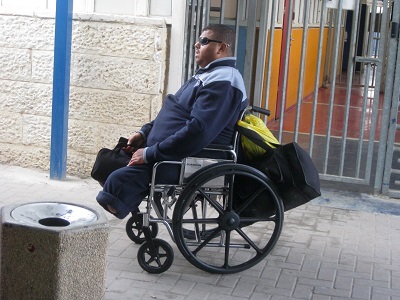
By Tamar Fleishman
I know that the only thing a person who has just been released from hospital wants and need is to crawl into bed. But according to the logic of the occupation, a person from Gaza who received treatment in a hospital at the West Bank is not an ordinary person.
A man, who had both his legs amputated, was discharged from a hospital in Ramallah after receiving treatment for a kidney disease. He sat waiting patiently for his uncle to go to the DCO offices, where perhaps the permit needed to allow him to return home on that very day, would be issued.
Patience, as well as submissiveness and forbearance, are resources needed for survival in the day to day life of any Palestinian individual and especially for one who lives in Gaza.
Only the accidental arrival of two Jewish women at that very place on that very hour could get all the hotlines rattle up. An hour passed and then another half an hour, when finally the man’s uncle was permitted to enter the offices where he received the necessary papers. Then, more calls had to be made until a man in uniform arrived and helped open the gates designed for the passage of carts.
With the man and his uncle was a child named Yusef who was also discharged from a hospital in Ramallah that morning.
Yusef is thirteen years old but his body’s measurements were of a four year old, he was seated on the shoulders of his father who was pushing the wheelchair of the amputee and carrying bundles and packages- because the people of Gaza who suffer from shortage in products, return to their besieged city with essential goods they bought at the West Bank that can’t be found in Gaza.
And Yusuf sat silently on his father’s shoulders. The child didn’t smile. The child didn’t speak. Lines caused by spasms appeared on his wide forehead from time to time, indicative of the pain he was in.
And after this hardship was behind them and the four crossed to the other side of the checkpoint and we said our goodbyes, they walked towards the cab that had been waiting for them for hours and we were left with a feeling of content mixed with a kind of sourness.
Because I believe it is a great disgrace to work towards improving what happens at that damn place and the reason I am there is to expose its and our disgrace, and to stand aside the victims.
But there is a breaking point. Ill people, especially from Gaza, cause me to break my principle of noninvolvement.
It is most important to look at the picture of this man and this child and to know that they are only two of hundreds, or perhaps thousands of people, who in addition to the suffering that fate has brought upon them, are subjected to the bureaucracy of the occupation which amplifies the burden of their pain.
(Translated by Ruth Fleishman)
– As a member of Machsomwatch, once a week Tamar Fleishman heads out to document the checkpoints between Jerusalem and Ramallah. This documentation (reports, photos and videos) can be found on the organization’s site: www.machsomwatch.org. The majority of the Spotlights (an opinion page) that are published on the site had been written by her. She is also a member of the Coalition of Women for Peace and volunteer in Breaking the Silence. She contributed this article to PalestineChronicle.com.





